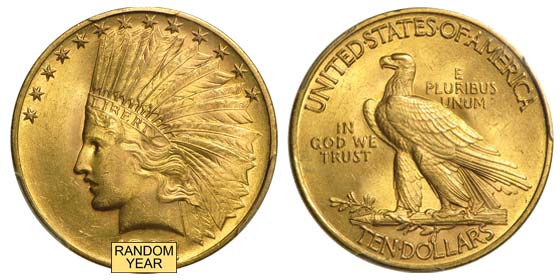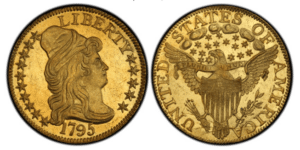Indian Head Gold Eagle Values
How Much Indian Head Gold Eagles are Worth: Indian Head Gold Eagle Values & Coin Price Chart

Year | Mint | Variety | Designation | VG-8 | F-12 | VF-20 | EF-40 | AU-50 | U-60 | MS-63 | MS-64 | MS-65 | MS-66 | MS-67 |
|---|---|---|---|---|---|---|---|---|---|---|---|---|---|---|
1800 | P | Plain 4- Stemless Wreath | Red-brown | 200 | 300 | 400 | 500 | 600 | 700 | 800 | 900 | 1000 | 1200 | 1100 |
| Year | Mint | Variety | Designation | VG-8 | F-12 | VF-20 | EF-40 | AU-50 | MS-60 | MS-63 | MS-64 | MS-65 | MS-66 |
|---|---|---|---|---|---|---|---|---|---|---|---|---|---|
| 1907 | (None) Phil | Indian | -- | $1,385 | $1,395 | $1,315 | $1,280 | $1,380 | $1,678 | $2,869 | $4,715 | $19,495 | $16,875 |
| 1907 | (None) Phil | Rolled Edge Satin Finish 1 Known | -- | -- | -- | -- | -- | -- | -- | -- | -- | -- | -- |
| 1908 | (None) Phil | No Motto | -- | $1,385 | $1,395 | $1,315 | $1,418 | $1,498 | $2,020 | $5,455 | $8,960 | $17,700 | $35,700 |
| 1908 | D | No Motto | -- | -- | -- | $1,315 | $1,368 | $1,398 | $1,863 | $7,770 | $14,250 | $58,400 | $85,250 |
| 1908 | (None) Phil | Motto | -- | $1,360 | $1,375 | $1,228 | $1,326 | $1,455 | $1,536 | $2,295 | $3,850 | $9,880 | $16,950 |
| 1908 | (None) Phil | 50-65 Known | -- | -- | -- | -- | -- | -- | $13,025 | $36,800 | $63,250 | $89,900 | $129,500 |
| 1909 | D | Motto | -- | -- | $1,375 | $1,228 | $1,248 | $1,455 | $1,639 | $5,863 | $13,862 | $35,150 | $48,700 |
| 1909 | S | -- | -- | -- | $1,475 | $1,360 | $1,595 | $1,639 | $5,310 | $13,110 | $15,900 | $26,550 | $50,900 |
| 1909 | (None) Phil | -- | -- | -- | -- | $1,228 | $1,175 | $1,286 | $1,622 | $3,195 | $6,885 | $15,775 | $28,500 |
| 1909 | D | -- | -- | -- | -- | $1,228 | $1,293 | $1,276 | $1,663 | $4,717 | $11,067 | $32,650 | $59,500 |
| 1909 | (None) Phil | 50-65 Known | -- | -- | -- | -- | -- | -- | $12,200 | $33,569 | $59,400 | $91,000 | $172,000 |
| 1910 | (None) Phil | -- | -- | $1,360 | $1,375 | $1,228 | $1,279 | $1,304 | $1,433 | $1,795 | $2,406 | $8,200 | $19,100 |
| 1910 | D | -- | -- | -- | $1,375 | $1,228 | $1,310 | $1,291 | $1,433 | $1,895 | $3,829 | $7,534 | $17,550 |
| 1910 | S | -- | -- | -- | $1,750 | $1,853 | $2,393 | $3,125 | $7,800 | $22,363 | $81,300 | $285,000 | -- |
| 1910 | (None) Phil | 60-75 Known | -- | -- | -- | -- | -- | -- | $13,850 | $37,900 | $62,150 | $88,250 | $150,000 |
| 1911 | S | -- | -- | $0 | $0 | $0 | $0 | $0 | $0 | $0 | $0 | $0 | $0 |
| 1911 | (None) Phil | -- | -- | -- | -- | $1,306 | $1,552 | $1,630 | $4,565 | $15,900 | $17,700 | $28,350 | $47,850 |
| 1911 | D | -- | -- | $1,360 | $1,375 | $1,228 | $1,231 | $1,323 | $1,433 | $2,037 | $4,123 | $9,833 | $27,100 |
| 1912 | (None) Phil | -- | -- | $1,360 | $1,375 | $1,228 | $1,279 | $1,295 | $1,444 | $2,295 | $3,467 | $10,100 | $17,150 |
| 1912 | S | -- | -- | -- | -- | $1,333 | $1,650 | $1,812 | $5,200 | $21,575 | $35,125 | $186,750 | $363,750 |
| 1912 | (None) Phil | 40-55 Known | -- | -- | -- | -- | -- | -- | $12,750 | $33,500 | $58,850 | $84,400 | $124,000 |
| 1913 | (None) Phil | 40-50 Known | -- | -- | -- | -- | -- | -- | $12,200 | $32,125 | $57,750 | $82,750 | $121,250 |
| 1914 | S | -- | -- | -- | $1,375 | $1,228 | $1,293 | $1,314 | $2,020 | $6,109 | $12,368 | $40,950 | $200,500 |
| 1914 | (None) Phil | 40-45 Known | -- | -- | -- | -- | -- | -- | $12,200 | $32,125 | $57,750 | $107,750 | $142,875 |
| 1914 | D | -- | -- | $1,360 | $1,375 | $1,228 | $1,279 | $1,312 | $1,608 | $2,600 | $6,109 | $12,285 | $29,875 |
| 1914 | (None) Phil | -- | -- | $1,360 | $1,375 | $1,228 | $1,279 | $1,230 | $1,447 | $2,040 | $5,005 | $9,538 | $27,400 |
| 1915 | (None) Phil | -- | -- | $1,360 | $1,375 | $1,228 | $1,279 | $1,230 | $1,433 | $2,241 | $4,279 | $8,055 | $22,825 |
| 1915 | S | -- | -- | -- | -- | $1,356 | $1,825 | $2,742 | $7,275 | $19,170 | $24,200 | $76,600 | $145,250 |
| 1915 | (None) Phil | 35-45 Known | -- | -- | -- | -- | -- | -- | $13,850 | $35,850 | $65,750 | $119,500 | $153,000 |
| 1916 | S | -- | -- | $1,360 | $1,375 | $1,228 | $1,279 | $1,398 | $2,710 | $6,775 | $11,790 | $29,600 | $56,700 |
| 1920 | S | -- | -- | -- | -- | $30,250 | $39,800 | $47,550 | $89,000 | $149,250 | $222,500 | $373,000 | $591,250 |
| 1926 | (None) Phil | -- | -- | $1,360 | $1,375 | $1,228 | $1,279 | $1,280 | $1,433 | $1,752 | $1,993 | $3,169 | $10,495 |
| 1930 | S | -- | -- | -- | -- | $20,900 | $25,300 | $28,600 | $48,400 | $74,700 | $92,350 | $114,200 | $238,000 |
| 1932 | (None) Phil | -- | -- | $1,360 | $1,375 | $1,228 | $1,302 | $1,282 | $1,433 | $1,876 | $2,040 | $5,177 | $11,268 |
| 1933 | (None) Phil | 30-40 Known | -- | -- | -- | -- | -- | $148,500 | $192,500 | $307,000 | $448,000 | $650,000 | $1,190,000 |
Description and History
When William McKinley was assassinated in 1901 in Buffalo, NY, most Americans had no idea how the new president, Teddy Roosevelt, would change things. He was a doer and was not very good at accepting excuses. Roosevelt wanted action!
By 1904 he began dealing with an issue that was very important to him – our coinage. Teddy was always blunt and to him, our present coinage was hideous! He didn’t hesitate to let those responsible for our coinage know he expected more and was displeased, The Chief Engraver of the Mint, Charles E. Barber, was none too pleased with the president either, as many of the current coinage designs were his own.
After the election in 1904, Roosevelt made it a priority to speak to his good friend, Augustus Saint-Gaudens about changing the coinage designs. All four circulating gold coins could be redesigned, as well as the cent, all without any Congressional approval required, so Roosevelt urged Saint-Gaudens to get to work on the $10 Gold Eagle and the $20 Gold Double Eagle.
The current $10 Gold Eagle was the Liberty Head design created in the 1840s by James Longacre. The design had remained unchanged for over 40 years. Saint-Gaudens instead created something more original and iconically more American. He created the head of Liberty, facing left, wearing a large Indian war bonnet. 13 six-pointed stars were arranged along the periphery of the top of the obverse while the date was centered under Liberty.
The reverse had a large and majestic-looking eagle standing on a bundle of arrows and an olive branch. The legends “UNITED STATES OF AMERICA” and “E PLURIBUS UNUM” were placed above the eagle while the denomination was below her. There was no “IN GOD WE TRUST” motto on the coin as Roosevelt objected to using the deity’s name on coinage.
The edge was unusual in that the 46 United States were represented by 46 raised stars on the edge. With the addition of New Mexico and Arizona in 1912, coins dated 1912 and later all now had 48 raised stars on the edge.

The public liked the 1907 design but did not like that the reference to God was omitted. In 1908, the motto “IN GOD WE TRUST” was restored to the coin and placed on the reverse in front of the eagle. The year 1908 will have coins struck both with and without the motto.
The initial year of minting, 1907, saw three different varieties of coins struck. The first variety is a wire rim with a period’s version of which 500 coins were struck. A second variety was created which had a rounded rim and periods between the words in the motto “E.PLURIBUS. UNUM.” only saw 50 coins struck. The third and final version was a no periods version in which 239,406 coins were struck.
In 1908, the no motto variety saw 33,500 coins struck at Philadelphia and 210,000 struck at Denver. The Motto variety saw 341,370 coins struck at the main mint and 836,500 in Denver and 59,850 in San Francisco.
As for other scarce dates, the 1911 coin struck in Denver only saw 30,100 coins struck, the 1913 coin from San Francisco had only 66,000 coins struck, the 1920-S had 126,500 coins struck, the 1930-S had 96,000 coins struck and in 1933 312,500 coins were struck with nearly all of them melted at the mint for their gold content.

